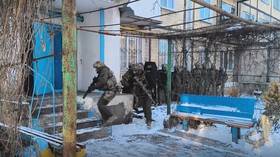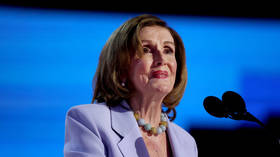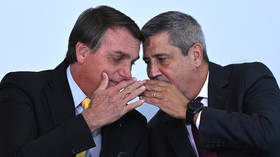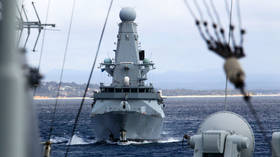Common sense prevailed in Brussels - Medvedev
In an interview with the Euronews TV channel, Dmitry Medvedev said he regretted Europe’s lack of understanding about why Russia acted in South Ossetia. However, Russia's President said common sense prevailed at the emergency EU summit in Brussels.
EURONEWS: What do you make of the EU Extraordinary Summit results? How will they affect Russia's future relationship with Europe?
Dmitry Medvedev: I've been following the summit closely. I can tell you frankly that I had preliminary contacts with some of my colleagues. I'd say the results were twofold. First, unfortunately, there is still no understanding of Russia's motives in making the decision to repulse Georgia's aggression, and in making the decision to recognise South Ossetia and Abkhazia as subjects of international law. This is deplorable – but not fatal, because in this world, things change. That's the first point. Another point is much more positive. Even though the EU countries were somewhat divided on this issue, a reasonable and realistic approach prevailed. Some countries called for some imaginary sanctions and punishments but it didn't happen. And I think Europe, primarily the European Union, is better off this way.
EURONEWS: Some say that by recognising South Ossetia and Abkhazia, Russia isolated itself from the international community. Do you agree?
Dmitry Medvedev: There is no isolation. Russia doesn't want to be isolated, and in fact it is impossible to isolate Russia. The fact of the matter is, after this recognition we all should consider the security architecture we want to have in our complex world in the years to come. It is totally obvious to me that the events that started with Georgian aggression on August 8 made this issue very urgent. The former security architecture proved itself ineffective.
EURONEWS: Still, some say there may be sanctions, like expulsion from the G8, or a ban on Russia joining the WTO. In case these measures are taken, what will be Russia’s response? Ordinary Europeans are concerned that a hot summer in the Caucasus may be followed by a cold winter in Europe.
Dmitry Medvedev: You know, with sanctions, nothing is ever that simple. Usually, sanctions are like a double-edged sword. I think the decision made by the EU demonstrates how dangerous sanctions are. Common sense prevailed, and the result is obvious. Now, as for other international instruments, say, the G8, it’s not capable of functioning without Russia. Moreover, G8 countries now realise that apart from countries like, say, China and India, without using the so-called “outreach” format, many decisions made by the G8 won’t be fully effective, to say nothing of decisions made without Russia. Thus, the G8 will not survive without Russia. Even if those countries try to come together separately, this will only have a negative effect on the world situation. The matter of the WTO is a particular economic subject. Indeed, we would like to join the WTO, but not at any cost. We have been negotiating on this issue for a long time, and unfortunately these talks haven’t been universally successful. Our position was simple: unless we made a deal soon, we were going to pull out of some treaties that imposed certain restrictions on us with regard to the WTO. We are probably going to go ahead with these steps, unless we see progress in the WTO process shortly. Russia’s membership in the WTO is not just something that Russia alone needs; other economies depend on this as well. We’ll see how things pan out. As for other levers of influence, I don’t think we should expect a cold winter or anything of that nature. Nobody wants to see that.
EURONEWS: What I meant was hydrocarbon supplies…
Dmitry Medvedev: Yes, I know what you were hinting at. Of course, we are going to fully honour all the obligations Russia took upon itself as the main supplier of hydrocarbons to Europe.
EURONEWS: Analysts believe that the Caucasus crisis turned the last page in Russia’s post-Soviet history. Now we are at a starting-point in a new world order –something you have just mentioned, to a degree. What kinds of relations does Russia want to have with its closest neighbours, like Ukraine, and the world in general?
Dmitry Medvedev: Our relations with all countries will be based on the same criteria. You are right, I have already said that the August events demonstrated how imperfect the current security architecture is. We need to re-create it according to the reality we face today. Some time ago, I listed five principles I will follow in Russia’s foreign policy. I’d like to repeat them now. First, Russia will fully abide by the standards of international law that define relations between civilised nations. Second, Russia believes the world should be multipolar. It thinks a unipolar world dominated by one state, no matter which one it is, is unacceptable. Third, we are naturally interested in developing normal, friendly relations with all nations in Europe, in Asia, with the United States, with Africa – with all nations on the planet. These relations will be as deep as our partners want them to be. Fourth, I believe that protecting our citizens’ lives and dignity, no matter where they are, is an absolute priority. This is another priority for Russia’s foreign policy. Finally, the fifth principle is that Russia, like any other state, has certain regions it will pay particular attention to. These are regions of our privileged interests. We are going to have special, cordial, long-term relations with the states in these regions.
EURONEWS: Is there a danger that the recognition of South Ossetia and Abkhazia will provoke separatist tendencies in other parts of the Caucasus, say, in Dagestan or Ingushetia?
Dmitry Medvedev: I see no danger here, unless these matters are worked on by people abroad, who create various scenarios to dismember Russia.
EURONEWS: What conclusions did you draw, or maybe what lessons did you learn, after the latest crisis in Russia-US relations?
Dmitry Medvedev: I don’t think this was a full-blown crisis, something comparable to the Soviet period. Yet there are tensions. We definitely didn’t want these tensions to start. These tensions were the result of a somewhat unwise policy the United States pursued with regard to Georgia. At a certain point, it gave the Georgian leader the impression he was free to do whatever he wanted and that there would be no retribution for his actions. It was as if he had a carte blanche to use whatever means he would choose. It is clear now what results this produced. I think today, some people in the US are frustrated that their virtual project called “Free Georgia” failed. Its leader discredited himself, its regime is facing a crisis, the situation is tense. The sooner our American partners figure out what is what in this matter, the better Russian-US relations will be. On our side, we are open to restore them in the best way possible. We are willing to have a completely normal relationship with the United States of America.
Meanwhile, in an interview with Italian TV channel RAIDmitry Medvedev talked about how relations between Russia and NATO have changed after Moscow's recent actions in South Ossetia and Abkhazia.
RAI: On August 26 you announced that a military response to the anti-missile shield in Europe is possible. Should we be afraid of confrontations that have never happened even during the áold War.
Dmitry Medvedev: I would ask our honorable partners to pay attention to the fact that it’s not we who are extending our borders in Europe, it’s NATO. It’s not us creating new bases, it’s NATO. It’s not us building new anti-missile shields, it’s NATO. And Russia has not responded so far. Instead we have continued dialogue. We said why do you need this? But if the decision to place missiles is made, if the radar is on then we’ll have to react to that, because no good explanations have been presented to us.
RAI: After the conflict in Georgia some states bordering Russia – Moldova, the Baltics, Ukraine in particular – expressed their concerns. And also taking into consideration the building of the anti-missile shield in the Czech Republic and Poland, how will you respond to the concerns of your neighbors?
Dmitry Medvedev: We won’t respond to the concerns of others. We would like to respond to our own concerns with NATO’s expansion and the growing level of arms around Russia. As for our partners – if we talk about the Baltic states, I think they have phantom pains, nobody is threatening them. It’s just a way of keeping the political elites in a slightly excited mood.
Ukraine is a separate subject. I think our closest neighbour now has a great chance to answer one simple question – how to provide their safety. If they think the way to provide safety is to join NATO, then at least only do it after the Ukrainian people get a chance to vote in a referendum on Ukraine's entrance into NATO. Because they are doing it behind the backs of the people, signing some documents, even though the Ukrainian people did not agree. Where is the democracy?
And, finally, about Moldova. I think that it is a completely different situation. Not so long ago President Voronin came. We discussed the situation in Transdniestr. I think we have good options to end this matter. I will be meeting with the Transdniestrian side tomorrow. So this is a separate subject in which Russia is ready to lend intermediary services.
RAI: Someone in the West started to talk about Russia's expulsion from the Group of Eight and Russia's market responded. Also major Western investors are said to be displeased. Aren’t you afraid that Russia will have to pay for the conflict economically and financially?
Dmitry Medvedev: As for the economy, any economy suffers during conflicts. But if we talk about fund rates, they suffer not because of the conflict in Georgia but due to the condition of the largest economy in the world – the American economy. I already told my American partners: it’s necessary that they secure themselves in that field, begin to restore the mortgage system, try to add liquidity to the financial market, because war usually does not make the situation better. What goes on in our trade market is 80 percent due to negative events taking place in America. And only 20 percent are maybe the consequence of the problems in Georgia.
RAI: Mr. President, you are the Supreme Commander-in-Chief. Can you explain to our listeners how responsibility is divided between you and Prime Minister Putin?
Dmitry Medvedev: The division of responsibilities happens according to the Constitution, the responsibilities of the prime minister and president are documented there. Russia is a presidential republic. The president has great power, including the right to use military force. It is my responsibility and I have to make the decision.
RAI: To solve the crisis in Georgia, Italy suggested an intermediary conference in Rome. In one of the interviews for our television company, President Saakashvili agreed to participate. Will you come to Rome to discuss the peace settlement?
Dmitry Medvedev: Of course we’re open to discussing anything at conferences and other international forums. But we would like the international community to remember who started the aggression, who’s responsible for killing people, and what price has been paid. As for the Georgian authorities: we think that the current regime has discredited itself. And to us, President Saakashvili no longer exists. He’s a political corpse. But we’re open to discuss any issues including that of the post-conflict settlement in the region.












